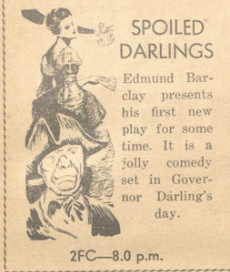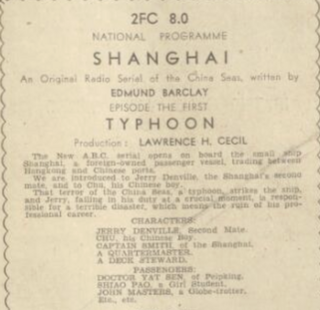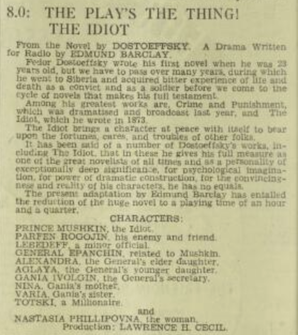
The Fortunes of Richard Mahony is a three-part novel by Australian writer Ethel Florence Lindesay Richardson under her pen name, Henry Handel Richardson. It consists of Australia Felix (1917), The Way Home (1925), and Ultima Thule (1929). It was collected in 1930 under the title by which it is now best known. Its publisher, William Heinemann Ltd, claimed on the jacket to the 1965 edition, "This is now recognized as one of the greatest novels in the English language." It was acclaimed for its rich characterizations and then-startling depiction of mental illness attacking an otherwise respectable person, while his much-younger wife, who does not think herself clever, must become resourceful with a high-level of uncomfortable capability. In recent years, it has been recognised as a graphic description of the onset and evolution of young onset dementia caused by neurosyphilis, the condition from which her father died.

Muriel Myee Steinbeck was an Australian actress who worked extensively in radio, theatre, television and film. She is best known for her performance as the wife of Sir Charles Kingsford Smith in Smithy (1946) and for playing the lead role in Autumn Affair (1958–59), Australia's first television serial.
Edmund Piers Barclay was an English-Australian writer known for his work in radio drama. Radio historian Richard Lane called him "Australian radio's first great writer and, many would say, Australian radio's greatest playwright ever." Frank Clelow, director of ABC Drama, called him "one of the outstanding radio dramatists of the world, with a remarkable technical skill and ability to use the fade-back without confusing the audience."

Murder in the Silo is a 1937 radio drama by Edmund Barclay. It was described as a psychological melodrama and was very popular at a time when Australian set radio dramas were relatively rare. Leslie Rees called it "one of the most effective of our shorter radio plays."

Spoiled Darlings is a 1940 Australian romantic comedy radio play by Edmund Barclay that was broadcast nationally on the ABC.
Neath Southern Stars was a 1938 Australian historical pageant written by Edmund Barclay. Commissioned by the Department of Education for the Sesquicentenary of European settlement of Australia, it was performed by a thousand secondary school students at Sydney Town Hall in March 1938.
Eureka Stockade is a 1933 Australian radio play by Edmund Barclay about the Eureka Rebellion. It was one of the first radio scripts by Barclay who went on to become arguably Australia's leading radio writer.

An Antarctic Epic is a 1933 Australian radio drama by Edmund Barclay about the Scott Expedition to Antarctica. It was the first radio drama script by Barclay who went on to become arguably Australia's leading radio writer.

Shanghai is a 1936 radio serial by Edmund Barclay. It ran for 26 weeks.
Underground is a 1943 Australian radio serial by Edmund Barclay. It was rare for most adventure serials at the time in that it had an Australian setting.
Khyber is a 1935 Australian radio serial by Edmund Barclay set in the north west frontier of India. According to contemporary reports "Undoubtedly it has proved one of the most successful serials ever broadcast in Australia or any part of the world."

Soldiers Three is a 1943 Australian radio serial by Edmund Barclay. It was commissioned for the Australian war effort to emphasise the contribution of Australian soldiers.
Joy Hollyer was an Australian writer whose career ranged from the 1940s until the 1970s. She collaborated a number of times on radio scripts with Edmund Barclay She wrote a large number of adaptations for ABC radio as well as television scripts, short stories and plays for children.
With Wings as Eagles is a 1943 Australian radio play verse drama by Edmund Barclay and Joy Hollyer about three airmen in World War Two.
As Strong as the Weakest is a 1945 Australian radio play by Edmund Barclay.
Ralph Rashleigh and the Bushrangers is a 1953 Australian radio play by Edmund Barclay based on an 1840s novel by James Tucker.
The Bolero Murder is a 1945 Australian radio play by Edmund Barclay and Joy Hollyer. It was one of a number of plays the two collarboated on together.
Dead or Alive is an Australian radio serial by Edmund Barclay. The series was a follow up to Barclay's successful serial Khyber.
Singapore Spy is a 1939 Australian radio drama serial from Edmund Barclay set in Singapore. It was an adventure serial in the vein of his earlier works Khyber and Shanghai.

The Idiot is a 1938 Australian radio drama. It was adapted by Edmund Barclay from the novel The Idiot by Fyodor Dostoevsky.









